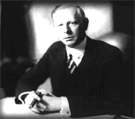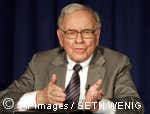 |
| Jesse L. Livermore |
Born: 1877 (South Acton, Massachusetts)
Died: 1940
Key Positions: None
Personal History:
Jesse L. Livermore is a fascinating case in which an outsider to the stock market world managed to thrive and amass vast personal wealth through ingenuity and skills gained through trading experience. Livermore left home as a teenager and moved to Boston to trade in stocks. His first position was posting stock quotes for the Paine Webber brokerage firm. By age 15, after having traded for himself for several years, Livermore had amassed a fortune of $1,000 (about $30,000 in today’s currency values).
Livermore earned money early in his investment career by betting against “bucket shops,” investment houses which allowed customers to make wagers on the price of stocks without actually investing in those stocks. Although Livermore was not formally educated in the practice of trading stocks, he did well enough that all of the bucket shops in Boston banned him. Thus, at age 20, Livermore moved to New York, where he continued his speculative trading as an individual. Livermore enjoyed many successes, but he also suffered from significant losses at various points. His career and life ended with his tragic suicide at the age of 63.
Investment Philosophy:
Livermore was an embodiment of the “self-made man.” His investment strategy was gleaned exclusively from the bets that he made and his reactions to the results, some of which were successful and others of which were not. Over the course of his career, Livermore accumulated a number of major principles by which he made investment decisions, and a number of these have remained popular axioms for investors today:
- Money is not made in day trading on price fluctuations. Livermore emphasized the importance of focusing on markets as a whole, rather than on individual stocks. He noted that greater success comes from determining the direction of the overall market than attempting to pick the direction of an individual stock without concern for market direction.
- Adopt a buy-and-hold strategy in a bull market and sell when it loses momentum. Livermore always had an exit strategy in place. (To learn more, see A Look At Exit Strategies.)
- Study the fundamentals of a company, the market and the economy. Livermore separated successful investors from unsuccessful investors by the level of effort they put into investing.
- Investors who focus on the short term eventually lose their capital.
- Ignore insider information; make your own independent analysis. Livermore was very careful about where he got his information and recommended using multiple sources. (For more insight, see Can Insiders Help You Make Better Trades? and When Insiders Buy, Should Investors Join Them?)
- Embrace change in adapting investing strategies to evolving market conditions.
Noteworthy Publications:
- "How to Trade in Stocks" by Jesse Livermore (1940)
- "Reminiscences of a Stock Operator" by Edwin Lefevre (1923)
- "Jesse Livermore – Speculator King" by Paul Sarnoff (1985)
- "Trade Like Jesse Livermore" by Richard Smitten (2004)
Quotes:
"Profits always take care of themselves but losses never do."
"The average man doesn't wish to be told that it is a bull or a bear market. What he desires is to be told specifically which particular stock to buy or sell. He wants to get something for nothing. He does not wish to work. He doesn't even wish to have to think."
"When it comes to selling stocks, it is plain that nobody can sell unless somebody wants those stocks. If you operate on a large scale, you will have to bear that in mind all the time."
The Greatest Investors: Peter Lynch
-
 Trading
TradingThe History Of Options Contracts
Options and futures contracts didn't originate with Wall Street power brokers. They started with rice traders a few centuries ago. -
 Personal Finance
Personal FinanceShort Selling: Making The Ban
Short selling has been around as long as the stock market, and it hasn't always been looked on favorably. -
 Insights
InsightsThe World's 10 Most Famous Traders of All Time
Here is a review of the most famous and infamous traders in history and how they affected the world. -
 Investing
InvestingThe 10 Biggest Shorts In The U.S. Equity Market
Short selling has been a painful strategy for investors in 2017. -
 Personal Finance
Personal FinanceNegotiate Your Salary Now for Greater Income in the Future
Here's why it's so important to negotiate your salary and some tips on how to effectively do it. -
 Investing
InvestingSohn Investment Conference 2018: Hedge Fund Titans Give Hot Tips
Here's what's happening at the 23rd Annual Sohn Investment Conference and the big ideas everyone is talking about. -
 Trading
TradingDay Trading for Beginners
Interested in day trading but don't know where to start? Here are some common day trading strategies, as well as some day trading tips for beginners. -
 Investing
InvestingThe 6 Highest Paid People On Wall Street
Learn more about the top Wall Street investors who made their fortunes with high-stakes hedge funds. -
 Trading
TradingThese are the most famous forex traders ever
Most currency traders avoid the limelight, but a select few have risen to international stardom. The five most famous forex traders share common virtues such as strong self-confidence.



